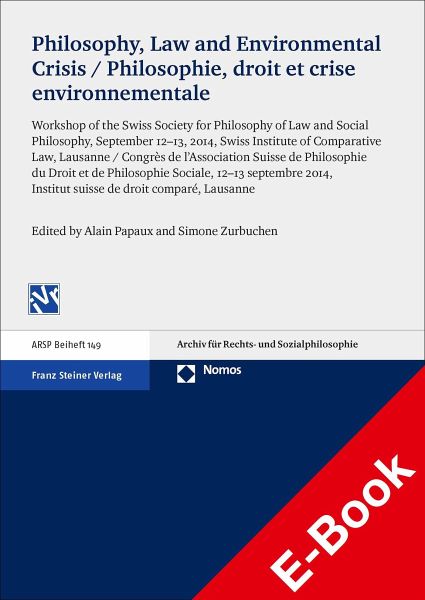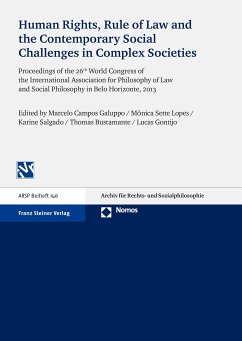
Philosophy, Law and Environmental Crisis / Philosophie, droit et crise environnementale (eBook, PDF)
Workshop of the Swiss Society for Philosophy of Law and Social Philosophy, September 12-13, 2014, Swiss Institute of Comparative Law, Lausanne / Congrès de l'Association Suisse de Philosophie du Droit et de Philosophie Sociale, 12-13 septembre 2014
Redaktion: Papaux, Alain; Zurbuchen, Simone

PAYBACK Punkte
0 °P sammeln!
Climate change belongs to the most pressing environmental problems we are facing today. Despite the agreement reached by the 2015 United Nations Climate Conference, this problem will remain on top of the political agenda during many years to come. This volume presents the proceedings of the workshop held at the Swiss Institute of Comparative Law, Lausanne, in 2014. The main objective was to engage a dialogue between philosophers and lawyers on three intricate questions related to the environmental crisis: first, what is the very nature of this crisis? In what way does it confront human beings ...
Climate change belongs to the most pressing environmental problems we are facing today. Despite the agreement reached by the 2015 United Nations Climate Conference, this problem will remain on top of the political agenda during many years to come. This volume presents the proceedings of the workshop held at the Swiss Institute of Comparative Law, Lausanne, in 2014. The main objective was to engage a dialogue between philosophers and lawyers on three intricate questions related to the environmental crisis: first, what is the very nature of this crisis? In what way does it confront human beings to the limits of the biosphere, and to their own finitude? Second, how should we conceive of responsibility towards future generations from a legal as well as from a moral point of view? Third, how to interpret the principle of common but differentiated responsibility, which plays a key role in environmental law and ethics? How to apply criteria such as the 'polluter pays', the 'ability to pay', or the 'beneficiary pays' principle in the face of empirical data of CO2 emissions in various countries and with a view on mitigation and adaptation?
Dieser Download kann aus rechtlichen Gründen nur mit Rechnungsadresse in A, B, BG, CY, CZ, D, DK, EW, E, FIN, F, GR, HR, H, IRL, I, LT, L, LR, M, NL, PL, P, R, S, SLO, SK ausgeliefert werden.













